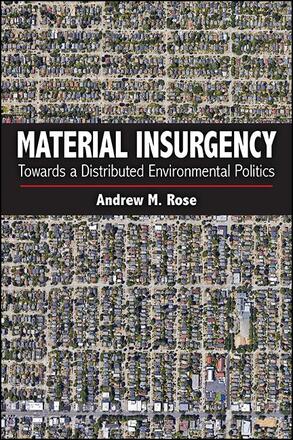
Material Insurgency
Towards a Distributed Environmental Politics
Alternative formats available from:
Examines emerging new materialist and posthuman conceptions of subjectivity and agency, and explores their increasing significance for contemporary climate change environmentalism.
Description
In Material Insurgency, Andrew M. Rose examines emerging new materialist and posthuman conceptions of subjectivity and agency and explores their increasing significance for contemporary climate change environmentalism. Working at the intersection of material ecocriticism, posthuman theory, and environmental political theory, Rose critically focuses on the ways social movement organizing might effectively operate within the context of distributed agency. This concept undoes the privileging of rational human actors to suggest agency is better understood as a complex mixture of human and nonhuman forces. Rose explores various representations of distributed agency, from the pipeline politics of the Keystone XL campaign to the speculative literary fiction of Leslie Marmon Silko and Kim Stanley Robinson. Each of these cultural and literary texts provides a window into the possible constitution of a (distributed) environmental politics that does not yet exist and operates as a resource for envisioning environmental actors we cannot necessarily study empirically, because they are still only a prospect, or potential, of our imagination.
Andrew M. Rose is Assistant Professor of English at Christopher Newport University.
Reviews
"Material Insurgency offers a unique and valuable perspective on distributed agency and distributed environmental politics, making it an excellent resource for classes in eco-theory and social justice discourses. The text is written in an accessible language structure, which caters to both those already familiar with these academic disciplines and those willing to put in the effort to understand the theoretical foundations presented. Rose's approach of first situating the problem and establishing the conceptual framework for distributed agency through a mix of fiction and nonfiction cases results in a compelling theoretical discussion point." — H-Net Reviews (H-Environment)
"Material Insurgency identifies a set of important contributions recent environmental literature, posthumanist, and new materialist theory (respectively and in conversation) might make to environmental politics and social movements today. Focusing on the crucial question of agency, which plagues environmental action, neoliberal political life, and social theory today, Material Insurgency develops a convincing case for pursuing posthumanist, nonanthropocentric, 'distributed' models, such as those imagined in these influential works of fiction. The greatest strengths of the book are its ability to bring together these timely conversations in a series of insightful, provocative ways." — Laura Shackelford, Rochester Institute of Technology